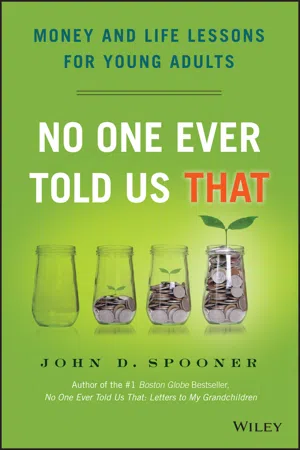
- English
- ePUB (mobile friendly)
- Available on iOS & Android
About This Book
The "new grownup" guide to managing your life and money in the modern economy
No One Ever Told Us That is a series of essential life and financial lessons that every adult needs to read before they embark upon their own life's adventures. You've completed your education, your couch surfing, and your internships—now it's time to grow up. You have a "real" job, maybe a family, and maybe a mortgage; but you've been launched into an uncertain world. This book is your much-needed guide to life as an adult, giving you the answers you need about becoming a professional, becoming financially secure, and becoming your own person. You see the world differently when you spend your days supporting yourself and your family, and money management quickly becomes an integral part of everything you do. This useful guide shows you how to do what you need to do, find the people you need on your side, and fulfill your obligations to those who matter most to you.
You may have been used to the idea of "independence" for a while by now, but when the reality of it hits, many new adults are thrown into a sudden state of panic. This book is your guide through the storm, your handbook for adulthood, and your personal companion for the journey ahead.
- John D. Spooner has a dual life. He has been named by Barrons as one of the top 100 financial advisors in America. As an author, the great mystery writer Robert B. Parker has said, "John Spooner is, quite simply, one of the best writers in America."
- Gain a fresh perspective on the world as a grownup
- Meet financial challenges with smart money management
- Assemble your personal, legal, medical, and financial support team
- Learn essential lessons before you suffer their consequences
- Written by the only full-time writer and money manager in America
Nothing in your experience has ever prepared you for the responsibility of responsibility. You've been thrown into the deep end, the undertow is strong, and the stakes are high—it's time to start swimming. No One Ever Told Us That gets you right on track to your brightest future.
Frequently asked questions
Information
PART I
BECOMING A PROFESSIONAL
CHAPTER 1
TAKE THE PRO TO LUNCH
Take an old pro to lunch.
CHAPTER 2
BEWARE OF EXPERTS
Beware the so-called experts and their absolute certainty about the future.
CHAPTER 3
IF YOUR COMPANY IS BOUGHT BY ANOTHER
There is no such thing a...
Table of contents
- COVER
- TITLE PAGE
- COPYRIGHT
- DEDICATION
- ACKNOWLEDGMENTS
- INTRODUCTION
- PART I BECOMING A PROFESSIONAL
- PART II BECOMING FINANCIALLY SECURE
- PART III BECOMING YOUR OWN PERSON
- ABOUT THE AUTHOR
- OTHER BOOKS BY JOHN D. SPOONER
- INDEX
- EULA